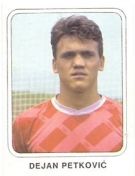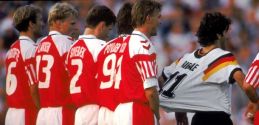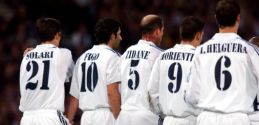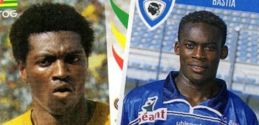
Player Profile: Dejan Petković
by David N
You’ll probably have heard of Dejan Rambo Petković if you know Brazilian football well. It seems unlikely, a Serbian playmaker becoming a legend for his exploits in Brazilian football, but Petković’s career is an unlikely one.
He first made a name for himself at Red Star Belgrade, arriving from Radnički Niš at 19 in 1992 with the massive task of replacing a couple of legends; Dejan Savicevic and Darko Pancev, both of whom had left that same summer. Petković was already a classy playmaker; capable of dribbling or passing his way through opposition defences, and a fearsome threat from set pieces. He won two league titles with Red Star, and his performances earned him a transfer to Real Madrid in 1995. There he barely played, was loaned out twice (to Sevilla and Racing Santander, again featuring little) and was reduced to appearing for Real Madrid B when Vitoria, from Salvador in Bahia in Brazil, spotted him in a friendly tournament and signed him in 1997.
He thrived in his two years at Vitoria, scoring a goal every two games and settling in to Brazilian life very well. Nevertheless, he returned to Europe for a short and ill-fated spell at Venezia in 1999. Rio giants Flamengo brought him back to Brazil in 2000, and if they are the club with which he remains best-associated, he had spells with five others over the next decade alongside a couple of brief stints in China (with Shanghai Shenhua in 2003) and Saudi Arabia (with Al-Ittihad in 2004/5).
He cemented his legend in Brazil at Flamengo, however, winning two Rio State Championships and one Copa dos Campeões in that first spell with the club. He was an early example of a phenomenon which has become more prevalent in the last few years - successful foreign playmakers in Brazilian football. As Brazil exported its own players who fit that role - Diego, Alex and Rivaldo are all examples - cheaper foreigners were imported to add a little creativity, a different way of altering the pace of a game. So Argentineans Dario Conca and Walter Montillo have been huge successes at Fluminense and Cruzeiro respectively, while Chilean Jorge Valdivia is a star at Palmeiras, all of them foot-on-the-ball attacking midfielders.
Well Petković did it first. He left Flamengo amidst much rowing and accusations of unpaid wages for rivals Vasco da Gama, picking up another Rio State Championship, in two spells interrupted by that Chinese sojourn, and then went to Saudi Arabia for big money.
He returned to a great period at Fluminense in 2005 and 2006, then Goiás and Santos, both in 2007 and Atletico Mineiro, before ending up back at Flamengo in 2009. In that period he’d scored and made many goals, won the love of fans who had previously hated him for his Flamengo associations, and fallen out with Coach Emerson Leao, explaining his departure from both Santos and Mineiro.
But Flamengo does seem like his club, and he was a key player in the 2009 Brazilian title win, his first as a player. He returned after six months out of the game, a free transfer seen by many in Brazil as a means for the club to get some value for the massive sums they still owed the Serb from his first spell there. At 37 he may have lacked his old pace and stamina, but his technique was as exquisite as ever, and his knowledge and understanding carried him through many games.
Reunited with Adriano, who had been unpopular with fans when he played at the club alongside Petkovic in his youth, before he accrued the fame and prowess he would arrive at in Europe, an immediate understanding developed. That duo, alongside second striker Ze Roberto, formed a devastating attack, with Petkovic supplying a string of assists and set-piece deliveries for “the Emperor” in particular. Flamengo went from 13th in the table to win that title, “Rambo” scored eight goals and won the Silver Ball award for best midfielder in Brazil - his third time to win that award - and he was inducted into the Brazilian Hall of Fame and made an honorary citizen of Rio. He also scored a couple of his trademark “Olympic” goals, direct from corner kicks - he scored eight in total during his career, apparently a record.
Brazil’s love of Petković is so ardent that there was even a campaign to have him represent the Brazil national team at the 2006 World Cup. This despite the fact that he had played seven times for Yugoslavia between 1995 and 1999. He was also linked with a call up for Serbia in 2006, but this never happened.
He retired this year, an event marked by the release of a film about him and his career in Brazil. “O Gringo” directed by his countryman Darko Bajić, looks like a pretty spectacular hagiography. But then Petković was a pretty spectacular player, with a spectacularly fascinating career.
More of David N’s musings on football from South America and beyond can be found on his Twitter page and his diversity knows no bounds, as he also writes excellent capsule film reviews.
Tags:Share this article
Leave a comment
- When did co-commentary become such a serious and miserable business?
- Why do we devote so much time to sharing our love of football for free?
- Villa’s Tokyo downfall: The apparent formality of a world title match
- Son Heung-min and the forgotten wonder goals
- Guess the Premier League goalscorer from the GIF
- A fateful flight
- Goodbye to the instant analogue gratification of Ceefax
- Player Profile: Steve Ogrizovic
- Rejecting FA Cup money in favour of a car boot sale
- It’s a man’s world? Former Arsenal manager crosses the gender divide











